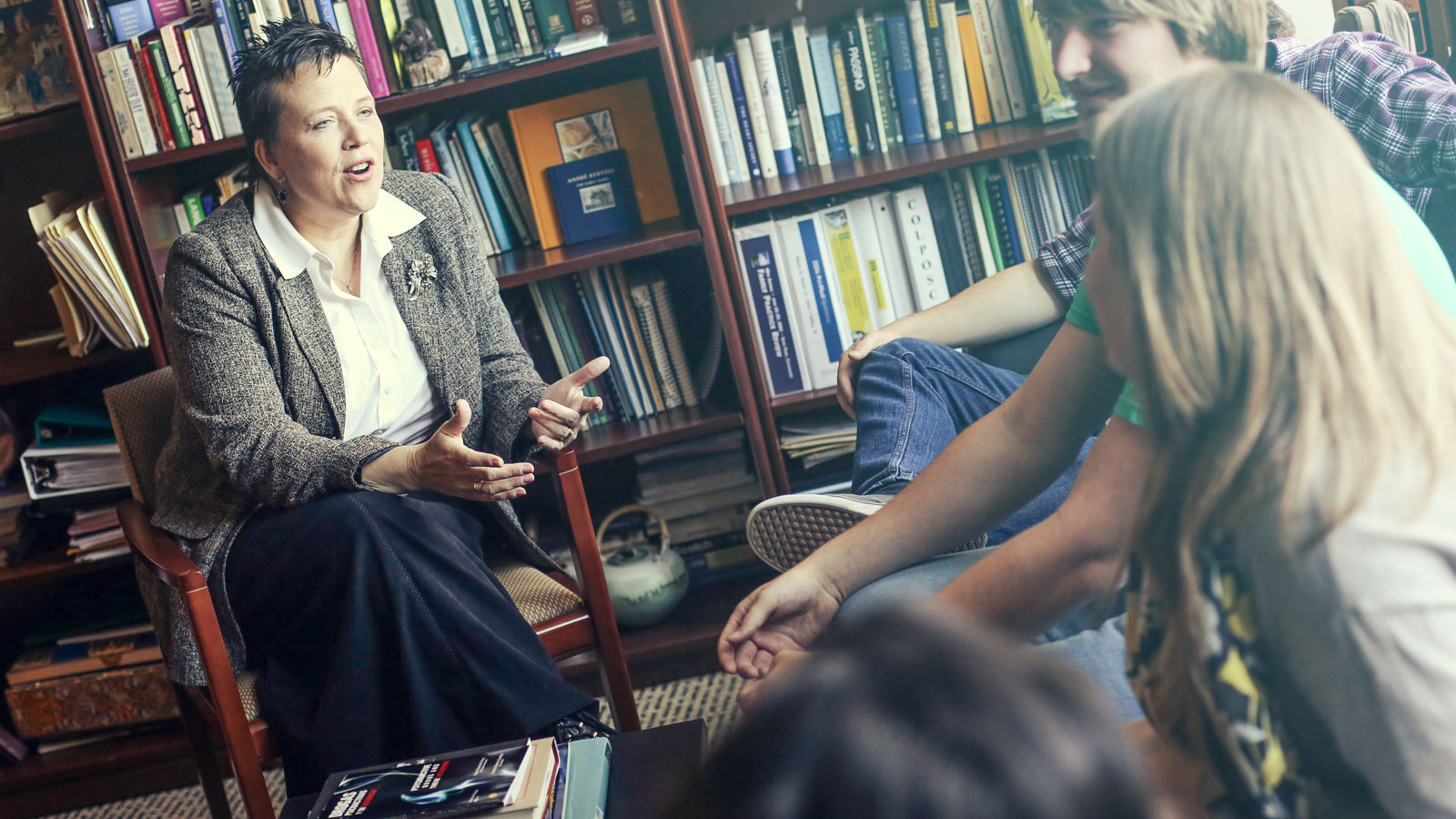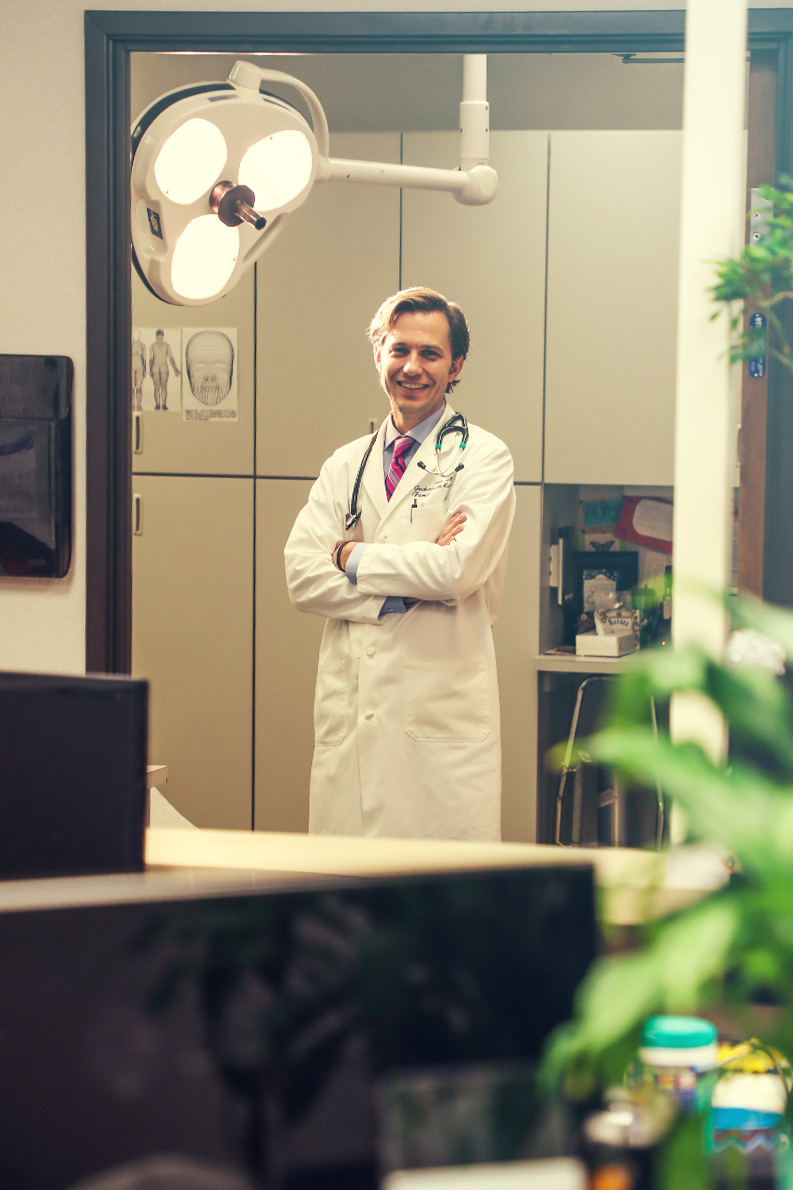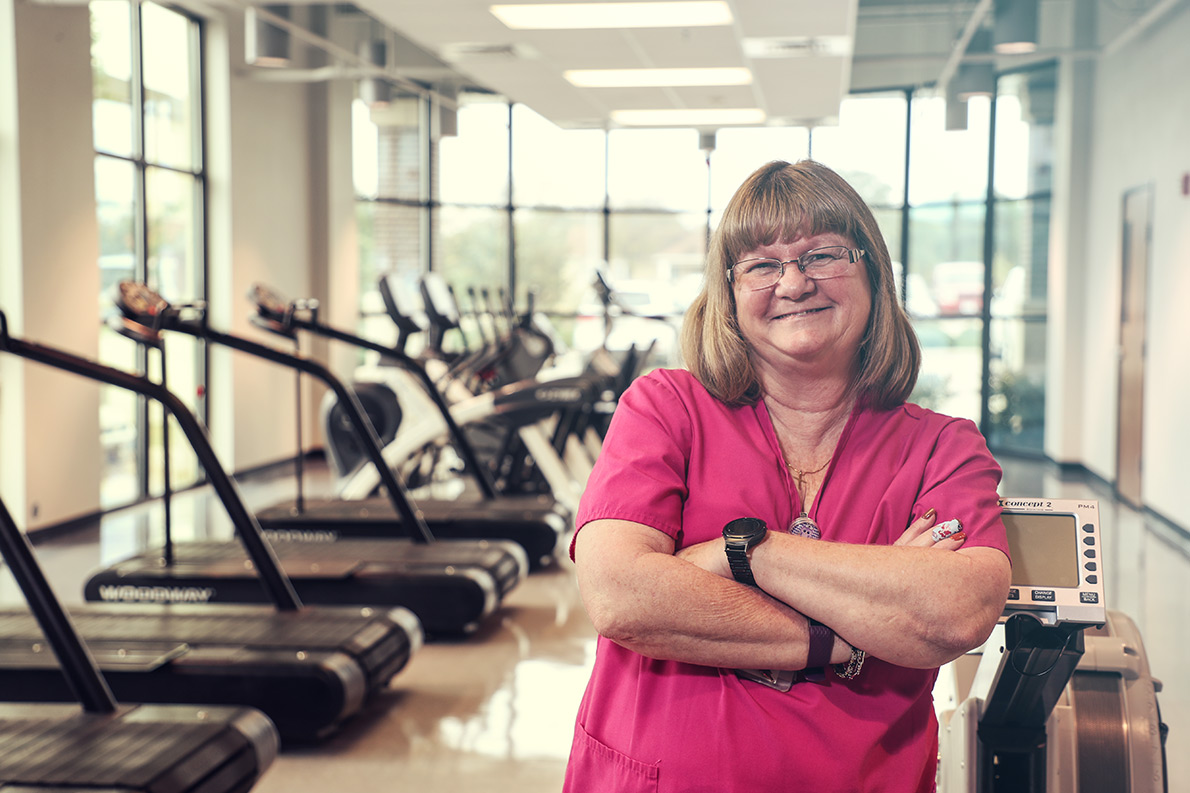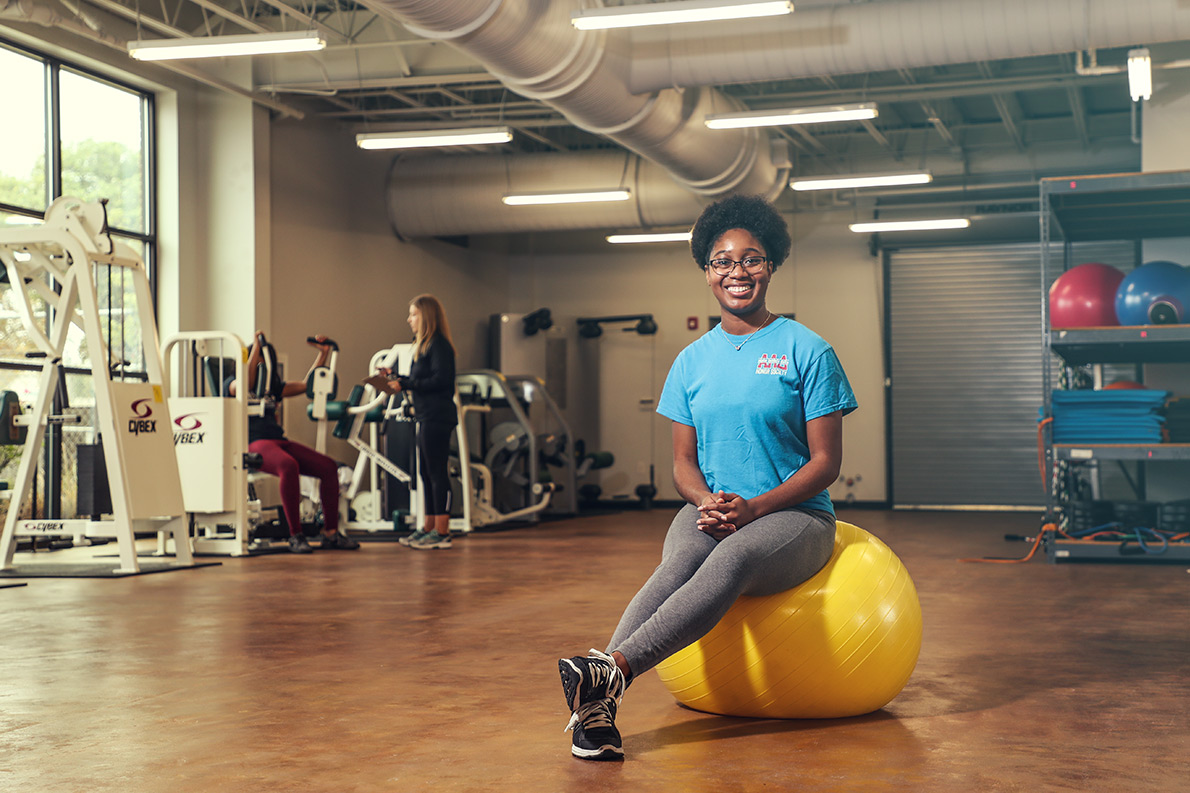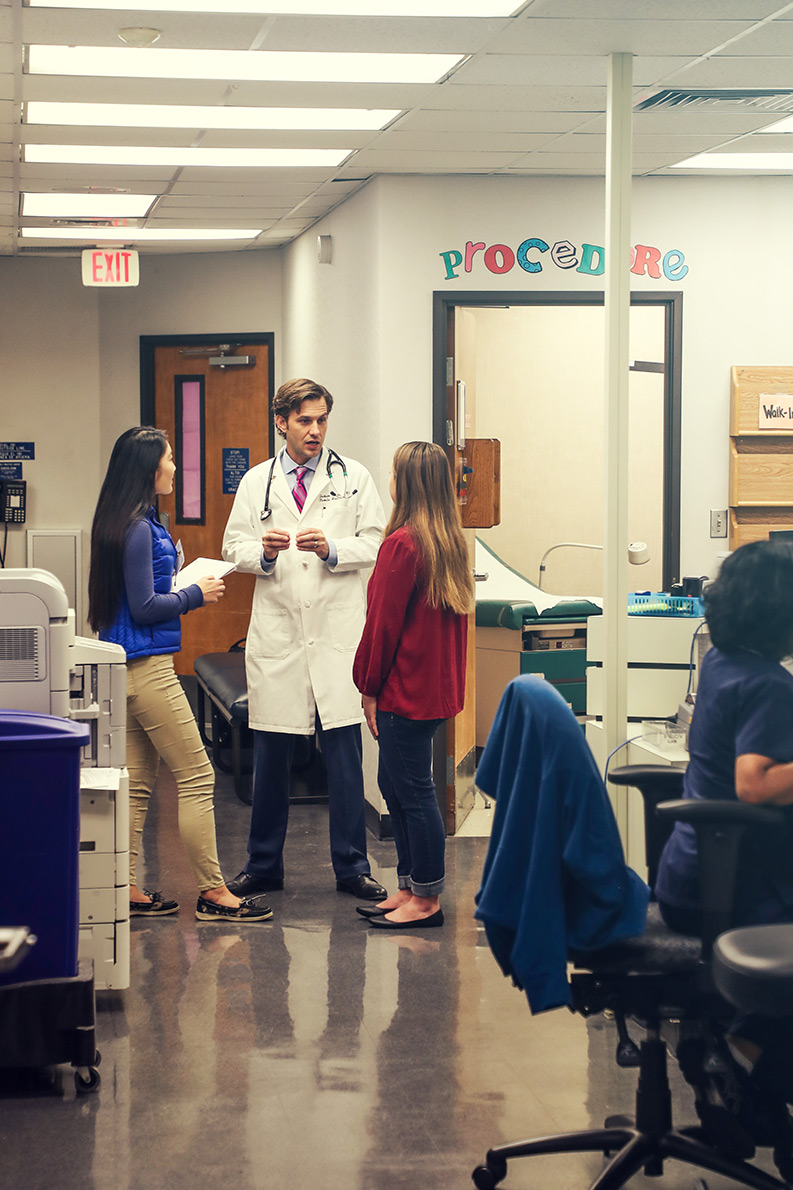Prescription for Compassion
Baylor partners with Waco's Family Health Center to address health concerns for area residents
enior Junelyn Gamao couldn’t ignore the draw to do more after assisting with research at Waco’s Family Health Center during her sophomore year.
“I realized how much the city was lacking in terms of access to nutritious foods and having adequate food and nutrition literacy,” she says.
The Family Health Center was founded nearly 50 years ago to address a shortage of doctors and a lack of primary care access for a vulnerable population. Since then, the clinic has expanded to 16 satellite locations serving the Heart of Texas, and more than half of the family physicians who practice in McLennan County have come through the Center’s residency program.
Last year, more than 100 Baylor students served nearly 3,000 hours at the Center, whether volunteering, conducting research or interacting as part of their coursework.
The magnitude of the partnership includes collaborations ranging from research focused on the effects of health anxiety on the utilization of medical services, to examining which tool is best suited to assess health literacy in primary care, to training law students and resident physicians on deposition and fundamentals of medical liability.
In 2016, the Center saw one out of every five McLennan County residents—more than 55,000 patients. Of patients who provided their income, more than 97 percent live at or below 200 percent of federal poverty guidelines.
Valued Volunteers
Most students on the pathway to becoming a doctor or pursuing a career in the medical field don’t get the chance to work in a clinical setting until they get to graduate school. That’s not the case with Baylor undergraduate students.
Dr. Lauren Barron, BA ’88, is director and clinical professor of Baylor’s medical humanities program as well as a family practitioner at the Family Health Center. She has worked tirelessly to ensure others don’t face the same struggle gaining practical experience she once did, and she’s making it possible in the same clinics where she once got her break.
“I feel like one of the reasons I’m on the planet is to help make those connections,” Barron says. “It’s a terrible thing when pre-med students leave Waco and they haven’t heard of the Family Health Center.”
“Spending time at the Family Health Center helps open students’ eyes to see that medicine is all about caring.”Dr. Jackson Griggs
Through Barron’s efforts, students in Baylor’s pre-health organizations can volunteer a few hours a week at the clinic. The program is now bursting at its seams, and making the partnership viable requires a large time investment. This includes but is not limited to HIPPA training, student background checks, immunizations, human-trafficking training and documenting volunteer hours.
“They all want to shadow doctors,” Barron says. “The point that I have made with these students is—‘You say you want to go to medical school and help people. Shadowing only helps one person and that’s you.’
“I try to coach them and help them understand that service is their ticket to shadow. You show up every week. You’re helpful. You’re there. You’re available. The next thing you know, the doctors are saying, ‘Hey I’ve got this great case. Do you want to come see it with me?’”
Student volunteer work may include making copies, organizing supplies or helping keep the waiting area clean.
“One of the most important things is seeing some of the day-to-day work that goes into doctoring,” Barron says. “They also get to see the importance of healthcare teams, so it’s not just the doctor. It’s the front desk, the nursing staff and all of the CNAs—everybody all working together.”
Gamao, who has volunteered for two and a half years, hopes to one day own a private practice. She is able to take what she learns in her textbooks and see it in practice. She’s enjoyed getting to know the Waco community more.
“As I have more and more interaction with the patients, it has really opened my eyes to how much healthcare support is needed in the Waco area,” Gamao says. “My experiences here have only solidified my decision of wanting to pursue a career in medicine and help underserved and under-represented communities.”
Dr. Jackson Griggs, associate program director of the Waco Family Medicine Residency Program, interacts with a number of Baylor students who assist at the Center. He says pre-health professions curricula tend to emphasize technical, scientific realities that form the foundations of biological life.
“This is obviously imperative education for health professionals; but, with a few notable exceptions, training for health professions does not emphasize the core of medical practice: care for human beings,” he says.
“Spending time at the Family Health Center helps open students’ eyes to see that medicine is all about caring. It illustrates that medical practice is far more than molecules, cells and organs—and that it has everything to do with people, their communities and their experiences of suffering and hope.”
One year, Barron gave her students an assignment to ride a city bus in Waco to the clinic. It took one of them more than two hours.
“She said, ‘You know I’m 20 years old. It’s a beautiful day. I’m not sick. I’m not pregnant. I don’t have kids. It’s not cold and rainy outside, and it took me over two hours one way,’” Barron says, quoting the student. Volunteering at the Center exposes students to people from all walks of life and helps them see barriers they often confront.
“[With patient permission], they get to be in the room in the sacred space that happens between doctors and patients,” Barron says. Students may have the chance to observe what it looks like for a doctor to share a terrible prognosis or deal with a difficult patient.
According to Griggs, primary care for the socioeconomically disadvantaged in Texas is constantly stretched.
“Family Health Center clinicians, nurses and staff are committed to high-quality care for the vulnerable, but this takes remarkable diligence and perseverance,” Griggs says. “Baylor student volunteers fill in needed gaps to help clinics operate more smoothly. By completing a variety of office tasks, student volunteers help clinics function efficiently and help reduce burnout among staff members.
Griggs notes that volunteers are unlikely to forget real people whose lives and health depend on the primary care safety net.
“The experience at the Family Health Center … subverts common myths about poverty and the people who experience it. It bears witness to the everyday heroism, grit and perseverance of the socioeconomically disadvantaged,” Griggs says.
Prescription Produce Program
Gamao took her passion and helped launch the Center’s prescription produce program last April in partnership with Waco’s World Hunger Relief Inc.
Through the program, World Hunger Relief raises, harvests, prepares and delivers vegetable prescription boxes twice a week to participating clinics. Doctors at the clinics then prescribe patients—especially those exhibiting indicators of malnutrition or food insecurity—a vegetable prescription with refillable, no-cost vouchers, similar to a traditional prescription for medication.
Patients can fill their prescription at a table located in the lobby of the clinic after their appointment. The table is facilitated by students in Baylor’s student organizations who provide the patient with the prescription box, recipes for using those ingredients and opportunities for further wellness participation in a number of Family Health Center programs. The hope is that the program will be a bridge to additional wellness programs there.
“I believe that this is where my heart and calling is—in the Center of those people who otherwise could not afford to see a physician,” Gamao says.
More than 1,000 boxes of produce—which could include kale, beans, lettuce, carrots, beets and more—have been distributed to patients since April. The food is grown on the 40-acre World Hunger Relief farm in Waco. The boxes are made available through a grant from the Episcopal Health Foundation in hopes of creating a long-term sustainable program over the next three years with more donors being sought.
The grant will provide enough prescriptions for two, 10-week harvests a year for two clinics through 2020. This impact is especially vital with Waco having what can best be described as 10 food deserts—neighborhood areas that do not provide walkable access to a grocery store.
“This is where my heart and calling is.”Junelyn Gamao
Student volunteers ensure patients understand the program, the contents and share how to properly read nutrition labels to help improve health literacy. Gamao is responsible for training the student volunteers and gives regularly of her time.
Joel Scott, director of development and outreach for World Hunger Relief, says Baylor students are the touchpoint providers and advocates.
“We love that it is pre-medical students who are already deeply invested in patient health and wellness,” he says. “The volunteers are trained by student officers who have been involved every step of the way. Their collective buy-in and excitement for the program has been mission critical.”
Patients also have access to a complimentary cooking demonstration class that shows them how to prepare the items in their boxes. During the class, volunteers engage with patients or serve as Spanish translators.
“It made me realize that being a physician means far more than earning money or having the title ‘MD’ at the end of my name,” Gamao says. “It means more to have the honor and privilege to serve by providing prime health care while having the opportunity to also educate them on living a more sustainable and healthy lifestyle.”
Wellness Center
About the Family Health Center
One of the bridges medical professionals at the Center hope the produce program will lead patients to cross is use of the new Wellness Center. The 5,000-square-foot facility opened in January 2017 at the Madison Cooper Clinic facility, the Family Health Center’s main location. The 25 pieces of exercise equipment range from rowing machines to treadmills to stair steppers and were donated from Baylor’s McLane Student Life Center.
The facility has been influenced by the Dallas-based Juanita Craft Recreation Center, a Baylor Scott & White Health facility, which also houses the Baylor Diabetes
Wellness Clinic.
Kelly Ylitalo, BA ’04, is an epidemiologist and assistant professor in Baylor’s Public Health program. Last spring, Ylitalo and her students conducted research with employees and nearly 350 patients. Research showed that 20 percent of respondents reported that places for them to be active were too far away and that it cost too much to be physically active.
The idea of the Wellness Center originated during the planning of the building, and Baylor’s FitCheck program demonstrated that a collaboration could be successful. FitCheck provides comprehensive health profile screening at no cost to the Waco community on the Baylor campus. Resident physicians from the Family Health Center assist with that program. From that, the idea developed to provide expanded physical care to patients on site at the Family Health Center.
Similar to the produce program, physicians write a prescription for patients to take part in an exercise program offered at no cost, with the equivalent of a fitness advisor and access to a gym. Master’s students from Baylor’s exercise physiology program serve as fitness coaches and work with patients for six to eight weeks. The facility is open weekdays from 7 a.m. to 5 p.m. and offers group classes as well as individual coaching.
Before opening to patients this fall, the program opened to Family Health Center employees in January 2017. Lynn Asyn is one of nearly 30 employees who took advantage of the opportunity to change their lifestyle.
Asyn, a 53-year-old mother of three sons and 10 grandchildren, works at the front desk, which keeps her sitting most of the day.
“Many of the patients we have want to exercise, but because of specific barriers they experience, they cannot.”Georgia Young
“I never had an initiative to [go to the gym]. Once I get home at night, I don’t want to go anywhere else,” Asyn says.
The convenience of the facility only one floor below where she works made exercise a more convenient choice. Now, she arrives at the Wellness Center each morning before work at 7. Baylor students were instrumental in Asyn’s comfort level and success.
“Any questions I had, they had an answer. If I needed help on anything, they helped me,” she says.
Asyn is committed to a routine five days a week that includes a 30-minute workout on the treadmill and elliptical machine. In September, she stopped the blood pressure medication she had been on for the past year, and she’s already lost 10 pounds.
Graduate student Yasmin Kiper, BS ’07, is one of the personal fitness advisers. She also teaches a relaxation and meditation class and believes exercise is medicine.
“Having a personal trainer is something that is becoming common; however, it can get very expensive,” Kiper says.
Because some patients are only able to meet with her weekly, she focuses on creating an individualized plan they implement at home without equipment.
“Each patient has different limitations and different goals,” she says. “Their exercise program has to cater to what they can do and what they are trying to accomplish.”
Georgia Young, BS ’17, another Baylor exercise physiology graduate student who works with patients, says common challenges facing clients include obesity, hypertension, Type 2 diabetes, poor nutrition and high cholesterol.
“Students will remember the tremendous character of our patients and may be more likely to devote some or all of their professional practice to caring for the socioeconomically vulnerable in their own communities.”Dr. Jackson Griggs
“Being able to help people in the Waco community improve their health through exercise free of cost to them is important. Many of the patients we have want to exercise, but because of specific barriers they experience, they cannot,” Young says.
Pete Grandjean, associate dean for research collaboration and graduate studies in Baylor’s Robbins College of Health and Human Sciences, says the program provides a preemptive approach. The goal is to help patients develop autonomy with their physical activity and healthy eating as well as resources.
“They take care of health needs when something comes up to a level that just physically debilitates them,” Grandjean says. “If we can provide the resources then we can start to hopefully educate them. We will have addressed some of these health concerns at a lower level of acuity, kept them out of the clinic … then overall our community is much healthier.
“It’s something that has never really crossed many of these patients’ minds before. When you’re living below the poverty line you’re struggling on a day-to-day basis to make ends meet, just to feed your children, to keep a roof over your head, keep electricity and water. Even if it did, they don’t have the resources or the place where they could go to keep themselves healthy.”
After patients complete the program, the hope is to provide resources so they can build on their success, whether through local parks and recreation services, community health centers located at a church, or the YMCA, all based on individual need.
Griggs, who interacts directly with the fitness advisors, says it isn’t only the patients who are impacted. Students giving of their time in all areas of the Family Health Center are impacted in a way that affects their future careers.
“In whatever sphere of healthcare students eventually practice, they will remember the tremendous character of our patients and may be more likely to devote some or all of their professional practice to caring for the socioeconomically vulnerable in their own communities,” Griggs says.
